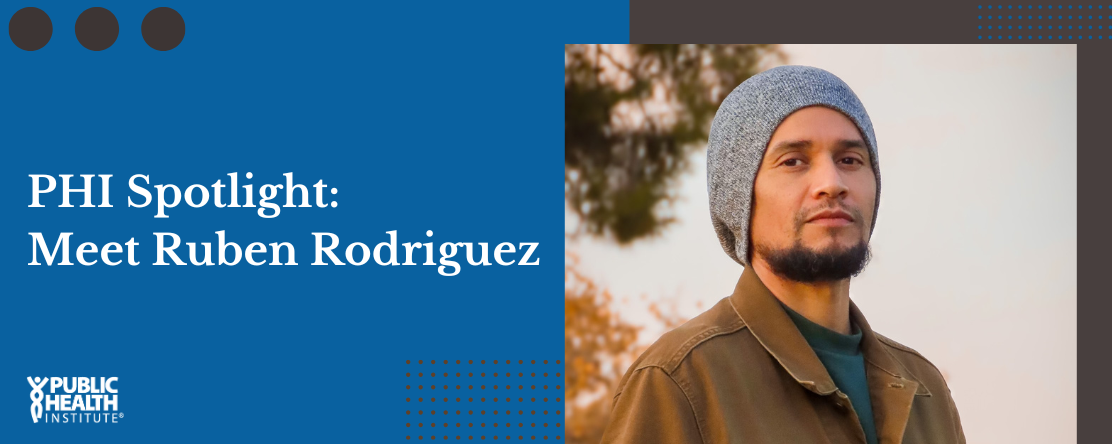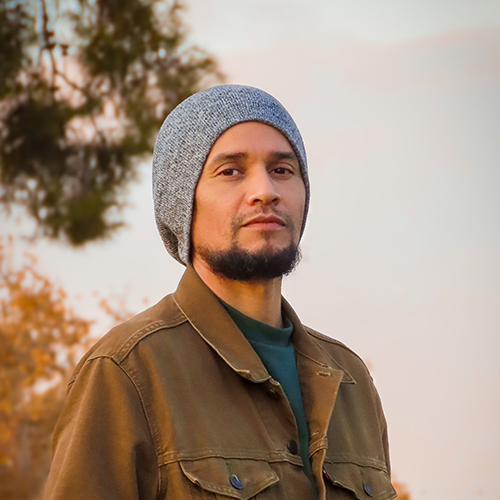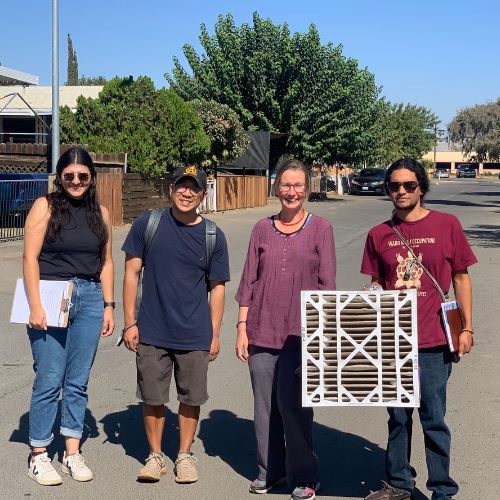
Update
PHI Spotlight: Meet Ruben Rodriguez, Community Member, Environmental Justice Advocate and Community Organizer
-
Focus Areas
Environmental Health, Healthy Communities -
Issues
Wildfires & Extreme Heat -
Expertise
Leadership Development -
Programs
Tracking California

In California’s San Joaquin Valley, agricultural workers are on the frontlines harvesting food for the nation. Many workers rely on swamp coolers in their homes during the summer months, when temperatures reach triple digits. During California’s increasingly frequent wildfire events, the coolers pull in large amounts of smoke and other air pollutants, forcing workers and their families to breathe in unhealthy indoor air.
In the summer of 2020, wildfire smoke from four major fires—SCU Lightning Complex Fire, Caldor Fire, Creek Fire, and the August Complex Fire—converged at the same time, creating hazardous smoke with extreme heat in Central Valley communities for several weeks.

I remember the day where the sky turned orange because of the wildfires. During that week we didn’t turn off the cooler even though we saw smoke inside the home. There was nothing we could do to stay cool and breathe clean air.Ruben Rodriguez
Coalinga community member, senior community organizer and director of air monitoring initiatives with the Central California Environmental Justice Network
Ruben Rodriguez lives in the rural community of Coalinga, located in California’s San Joaquin Valley and like many community members there, he had a home that was equipped with a swamp cooler. The Valley is known for its agricultural and oil industry and also experiences some of the worst air quality in the nation—its surrounding mountain ranges trap wildfire smoke and other pollutants, creating high concentrations of harmful particulate matter that can last for many weeks.
Ruben, who is also the senior community organizer and director of air monitoring initiatives with the Central California Environmental Justice Network (CCEJN), heard directly from many community members in the San Joaquin Valley who expressed serious health concerns as a result of indoor air pollution from the four fires. CCEJN works to eliminate negative environmental impacts in low income and communities of color in the Central Valley and is a key PHI partner in the region.
PHI and CCEJN launched the Filtration for Respiratory Exposure to Wildfire Smoke from Swamp Cooler Air (FRESSCA) Mujeres study, which grew out of the concerns from farmworker women in California’s San Joaquin Valley. The study takes place in Fresno, Kern and Kings counties of the San Joaquin Valley and aims to reduce wildfire smoke exposure and health risks among agricultural workers and low-income families by designing and field testing an affordable, effective filtration system for swamp coolers, and working with families so they can learn to install them on their own.
As a community partner on the FRESSCA Mujeres project, Ruben works alongside the community to ensure that their voices are heard and that there is an effective solution to address the health impacts of breathing in indoor air pollution. “It’s important to bring the community voices to the forefront,” explained Ruben. Ruben worked closely with community members in the San Joaquin Valley to create digital stories that document the health impacts of harmful air pollutants from wildfire smoke in their homes and demonstrate how the new air filtration system is helping to improve families’ health.
Ruben previously worked for the oil industry and for other major corporations in the Valley. He realized the recklessness and sometimes disregard that some of the companies had for the environment and the harmful impact on local communities. “I wanted to make sure that I brought that to the light, to not be part of that cover up cause you’re either part of the solution or you’re part of the problem,” added Ruben. “So, I wanted to be part of that solution.”
The FRESSCA home DIY filtration system has shown improvements in participants’ indoor air quality and has had a positive impact on their health and their family’s health. Families noticed a difference and initial readings indicate more than a 50% decrease in particle pollution after installing the filtration systems.
FRESSCA Mujeres is a unique partnership involving researchers, community partners and community members—all of whom are women. The project was funded by the U.S. Environmental Protection Agency’s Science to Achieve Results (STAR) program and California Breast Cancer Research Program and involves the following partners:
- Central California Environmental Justice Network
- PHI’s Tracking California
- California Department of Public Health Environmental Health Laboratory
- University of California, San Francisco
- Illinois Institute of Technology, Built Environment Research Group
- California Office of Environmental Health Hazard Assessment
“They were all key partners. Each of them held a very special piece to the puzzle and I think if it wasn’t for all of us there, the project wouldn’t have been as successful,” said Ruben. His hope for the future is that some of the agencies who are supposed to be protecting the health of communities can take some of the responsibility and provide air purifiers and air filters for homes, especially for those who do not have the resources.
Learn more about the Central California Environmental Justice Network & Ruben’s work →

Explore more of Ruben's work on the FRESSCA project
Swamp Coolers Pump Smoke into Homes During Wildfires. In the Central Valley, Researchers and the Community Work on a Solution: Read news coverage.
Watch: Farmworkers in CA’s San Joaquin Valley Document the Dangerous Health Impacts from Wildfire Smoke & Other Environmental Hazards: See their digital stories.
Community Members in CA's San Joaquin Valley are Breathing Cleaner Air due to a New Air Filtration System: Read the impact story.
Video: Join the FRESSCA Project for Clean Air at Home (Featuring Ruben Rodriguez):
More Updates


Safeguarding the Health and Wellbeing of Agricultural Workers in Monterey County: A 5-Year Glance at the COVID Pandemic & Lessons Learned

New Study Reveals Why Alcohol Use Increased During the Pandemic

PHIL Collective: Tools, Training and Resources for Collaborative, Cross-Sector Efforts to Improve Health and Equity
Work With Us
You change the world. We do the rest. Explore fiscal sponsorship at PHI.
Support Us
Together, we can accelerate our response to public health’s most critical issues.
Find Employment
Begin your career at the Public Health Institute.
